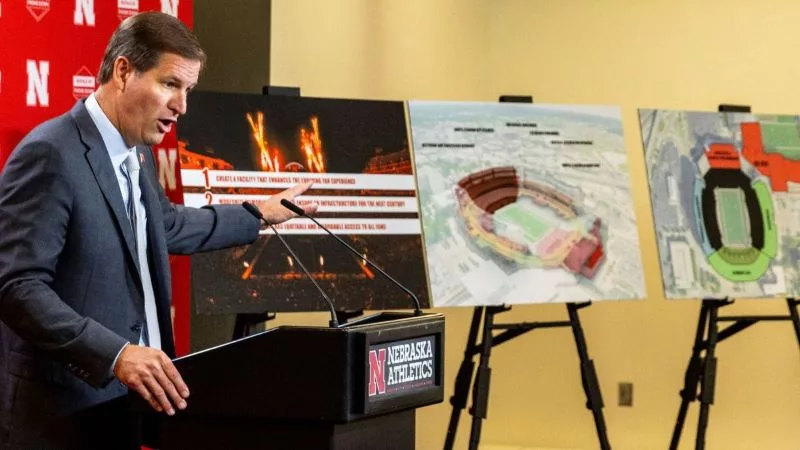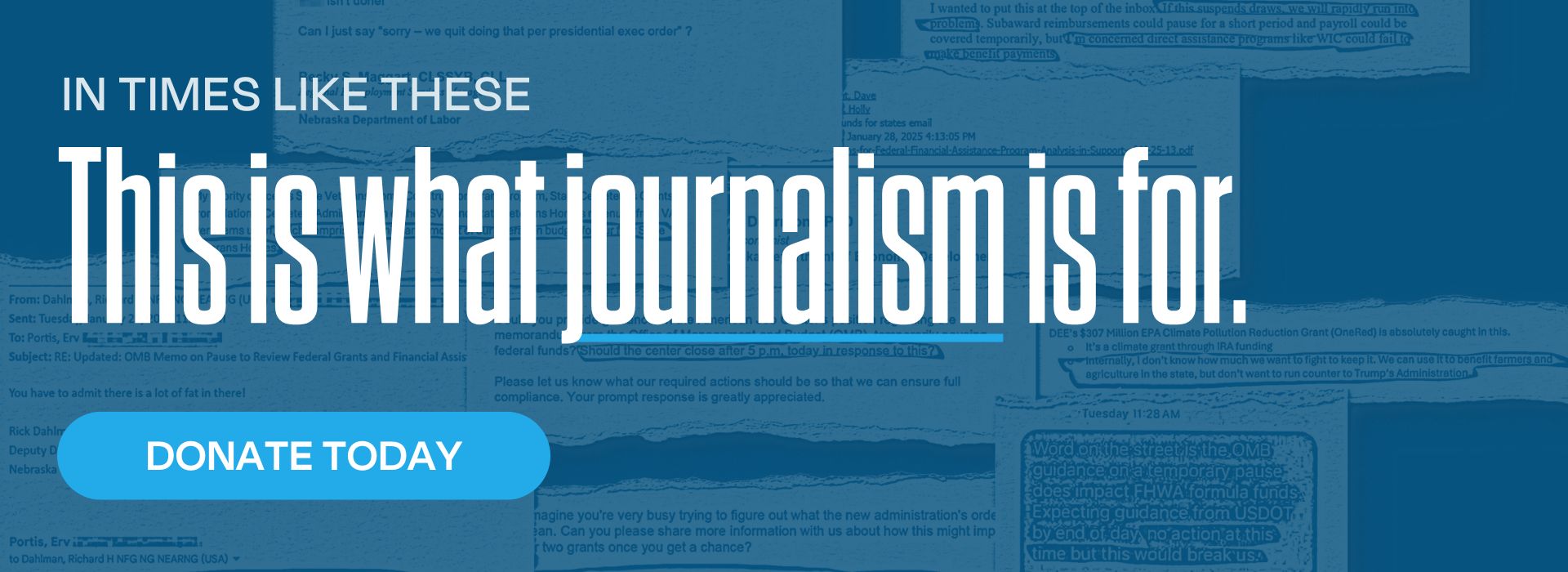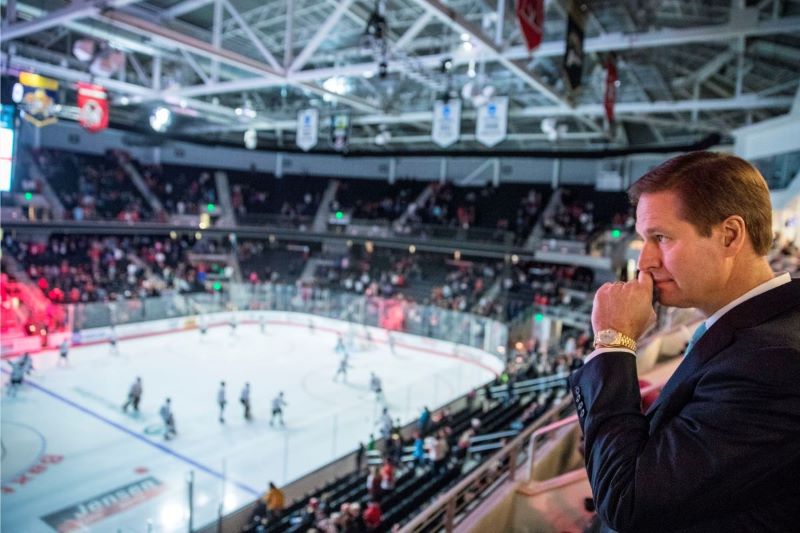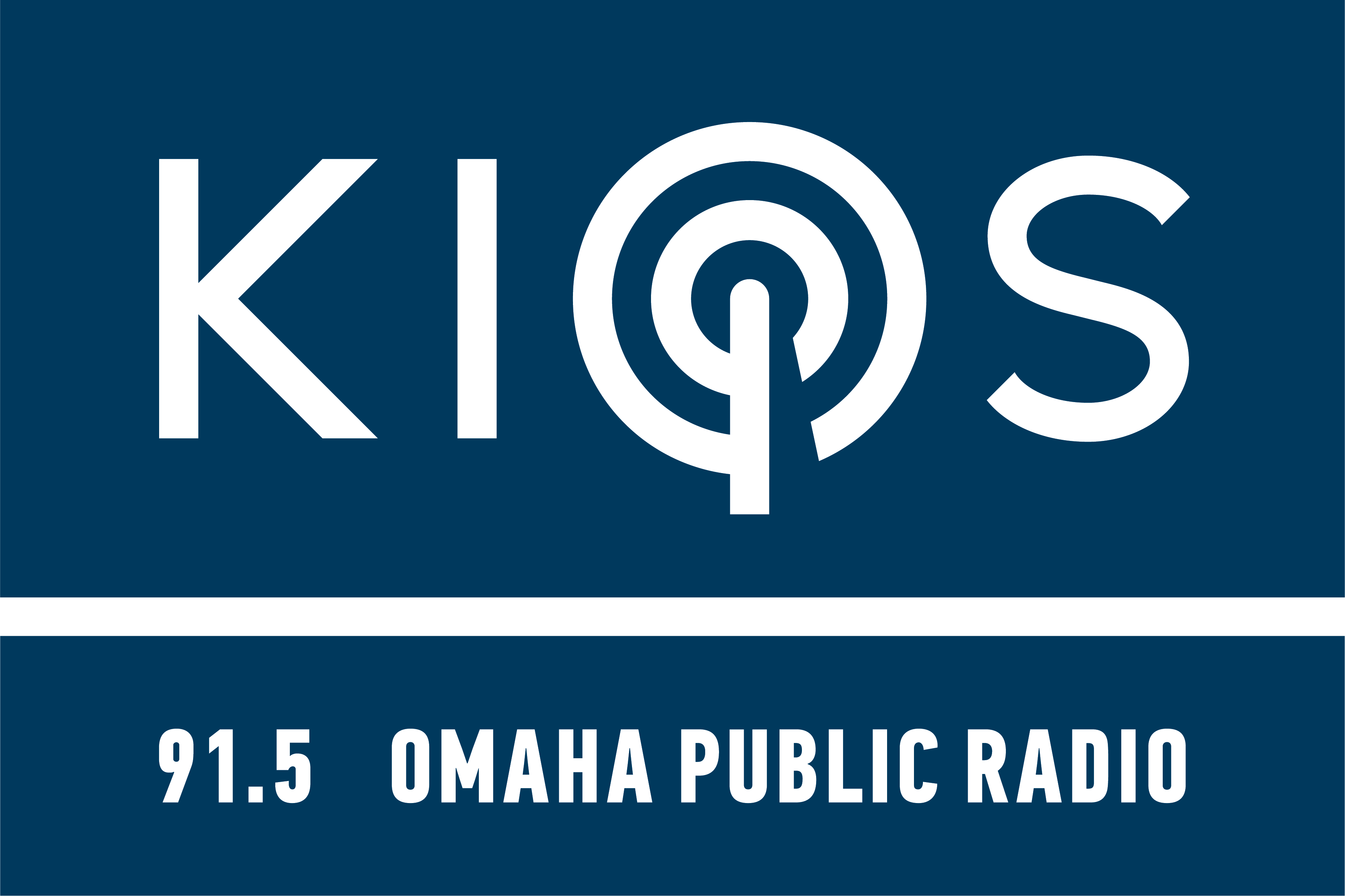A “historical lack of fiscal discipline.” A “lack of monitoring” of projected budgets. Funds improperly “disguised” as revenue alongside an allegation that donors and university leaders were misled on financial details.
An internal memo doesn’t mince words: The University of Nebraska at Omaha’s athletic department finances remain in a precarious state. They have been for years, the six-page memo alleges. Most of it occurred under the leadership of Trev Alberts, now the University of Nebraska-Lincoln athletic director.
At UNL, Alberts is now leading one of the biggest fundraising projects in state history, a high-profile, $450 million renovation of Memorial Stadium.
At UNO, three big infusions of unbudgeted university support – including more than $7 million in federal COVID-19 money – have failed to pull Maverick Athletics out of the red, the memo says.
Now a range of budget cuts are on the table, including layoffs and the possible elimination of further UNO sports.
University leaders declined to answer questions about the specific statements and allegations contained in the memo, which was requested by UNO Chancellor Joanne Li. The memo was first sent to university leaders in June.
But University of Nebraska President Ted Carter and the NU Board of Regents’ chair and vice chair issued statements strongly supporting Alberts.
“This is a period of dramatic change in college athletics. The University of Nebraska’s goal is to keep our athletic departments on the forefront of the evolving landscape. We will do so with integrity, accountability and fiscal responsibility,” said Carter in his statement. “I hired Trev Alberts as the Huskers’ AD because he brings exactly that skillset to the position. I have confidence in the decisions Trev made while at UNO, and I believe he is the right person, at the right time, to lead Husker Athletics into the future.”
Robert Kelchen, a University of Tennessee higher education professor and national expert on higher ed finance, reviewed the memo at Flatwater Free Press’ request. A university athletic department struggling financially is normal, he said. What’s abnormal: The alleged lack of oversight, and the allegations of hiding budgetary details.
“I think it’s a combination of two things. One is pretty mundane: Athletic programs are expensive. That’s typical,” Kelchen said. “But then something else happened with their accounting … It’s either an accounting irregularity, or fraud. The term ‘disguised as’ raises all kinds of red flags.”
The Flatwater Free Press obtained the memo and accompanying documents via a public records request made to the University of Nebraska’s Office of the General Counsel.
The memo covers July 2016 through the end of June 2022. Alberts led UNO’s athletic department during that period until departing for UNL in July 2021.
During that time, UNO also got a new chancellor. In July 2021, Li replaced Jeffrey Gold, who had been serving as chancellor for both UNO and the University of Nebraska Medical Center. He’s still chancellor for UNMC and executive vice president and provost of the NU system.
University of Nebraska President Hank Bounds, who was keeping close tabs on the UNO athletic department’s finances, left the university in 2019. He was succeeded by Carter, who is himself leaving as NU’s president at the end of this year.
Through a spokesman, Li and Adrian Dowell, the vice chancellor of athletics who replaced Alberts, declined interview requests Wednesday. The UNO spokesman largely declined to answer a list of detailed questions about the memo. In a joint statement sent Thursday, Li and Dowell said they have “full confidence in the long-term sustainability” of UNO athletics.
“We come to work at UNO every day thinking about how UNO Athletics can best support our Maverick student athletes,” they said. “It is common practice to regularly assess our operations to make certain we are set up for future success. UNO remains faithful stewards of our resources.”
Alberts also declined an interview request but emailed a statement. He acknowledged difficult decisions made while at UNO and also extolled the hard work and budget success of the athletic department staff while he led it.
“During my time at UNO, we focused on operating the athletic department in a fiscally responsible manner,” he said. “I am proud that we were able to deliver balanced budgets or surpluses in both athletics and at Baxter Arena until the COVID-19 pandemic.”
According to the memo, financial statements and annual reports from the athletic department first prompted questions from university leadership in February 2022. They also appear to have prompted action.
In July 2022, UNO’s executive associate athletic director and chief financial officer was “terminated,” according to the memo. That appears to be Brent Meyer, who was in that role then and went on to fill a similar role at Washington State University in fall 2022.
Meyer stepped down at Washington State in April. In May, WSU’s athletic department froze hiring and some non-essential spending while school leadership investigated budget issues and mismanagement.
Meyer is now employed by Alberts at UNL, where he’s listed as a senior associate athletic director.
Doug Ewald, UNO’s former vice chancellor of business and finance, also followed Alberts to UNL. He’s now the Husker athletic department’s executive associate athletic director and chief financial officer.
Just after the CFO was terminated at UNO, Dowell required the department to conduct a “financial analysis” of athletics spending. Li then ordered further analysis to get a deeper understanding of the department’s history.
Some of the athletic department’s budget woes in this timeframe were already well known.
The Omaha World-Herald reported in 2017 that it struggled to find its financial footing after moving to Division I and building Baxter Arena.
In public records, The World-Herald found that Bounds had become involved, urging the department to rein in its finances. Leaders expressed confidence in the Division I decision, which included a controversial cut of the university’s football and wrestling programs, and the department’s financial progress.
Alberts at the time said that UNO needed to “operate Baxter Arena and the athletic department in a fiscally responsible manner.”
It’s rare for any Division I athletic department to make money – the department Alberts now leads at UNL is a financial unicorn that has long turned a profit.

But the recent analysis shows that UNO’s athletic department wasn’t just losing money.
University support and student fees backfilled the department with an increasing subsidy that rose each year from $3.9 million in 2016 to $5.9 million by 2022. And it points to three big infusions of additional, unbudgeted money from the university.
In fiscal year 2016, UNO provided about $3.2 million in unbudgeted funding. The following year, it provided the athletics department more than $4 million in unbudgeted support.
Then, in 2022, the university provided the athletics department $7.1 million in federal funding meant to help UNO mitigate impacts of COVID-19. They began to allocate that funding in the months after Alberts departed and Li arrived.
The UNO athletics department ended up getting 21.2% of the $33.6 million that UNO received, total, from the initial rounds of COVID-19 relief money, known as the Higher Education Emergency Relief Fund, the memo says. (The university more recently received more federal relief money, but none of it went to athletics, a UNO spokesperson said.)
Much of it – $4.4 million – went to Baxter Arena operations.
In the wake of COVID-19, the federal government handed out $76.2 billion in relief funding to colleges across the country.
Half was reserved for student aid. The rest of the one-time cash could go toward making up almost any costs associated with the pandemic, meaning colleges could largely spend it how they saw fit.
Nationally, campuses put the money toward replacing lost revenue, emergency grants for students, equipment for remote learning and campus safety, according to an analysis by the Chronicle of Higher Education.
Colleges could also funnel that money to athletics departments, so long as the money didn’t go toward capital projects for sports facilities. According to a 2021 analysis by Sportico, a sports business news outlet, at least 60 Division I athletics programs received a combined $55 million in COVID-19 relief funds as of May 2021.
That money went to things like COVID-19 tests and protective equipment, as well as making up for the loss of student fees and ticket revenue.
“Athletics is a fairly common category” for college COVID-19 funds, Kelchen said. “That’s because ticket sales were down or nonexistent for a year or two. That was a big loss of revenue.”
At UNO, the analysis shows that the extra help that the university gave Maverick athletics in 2016, 2017 and 2022 didn’t result in a balanced budget.
The analysis also alleged that the department “disguised” the Baxter Arena’s maintenance and repair value as revenue it could use for operating costs.
“This would be an inaccurate use of funds,” the memo reads. With that money subtracted from its revenues, the accompanying analysis shows that the arena’s balance was in the red three of seven years. It shows that the department’s overall ending cash balance was in the red for five years.
The department didn’t put money into that maintenance and repair cost center for 2020-22, the analysis reads, “despite what was communicated to project donors and the university.”
The university has thus far refused to provide further clarity around this part of the memo.
Two University of Nebraska regents – Tim Clare, the board’s chair, and Rob Schafer, the vice chair – released a statement saying that Alberts has led the UNO and UNL athletic departments with “integrity and accountability.”
“Operating a college athletics program is a big job,” they said. “It takes strong management skills, the ability to make tough decisions and the very highest levels of integrity. For as long as we’ve known him, Trev Alberts has delivered. Athletics are expensive, and there are unique challenges for smaller programs like UNO’s. … But sports are an integral part of our vibrant campus culture and we strongly support the investments we’ve made in our student-athletes.”
The two regents said that “every dollar of donor money” has been used as directed in the athletic departments and that the Alberts-run programs “have been responsibly and transparently managed.”
“We have 100% confidence in his leadership,” the regents wrote.
The Flatwater Free Press called each of NU’s eight regents, including Clare and Schafer. Six didn’t return phone messages. Regent Kathy Wilmot of Beaver City said she wasn’t familiar with the analysis. Jack Stark of Omaha declined comment.
Student fees, university help and the department’s own revenue isn’t enough to balance out the budget in projections going forward, according to the memo.
The memo concludes that this is partly because of “a historical lack of fiscal discipline … with respect to the development of an accurate and realistic operating budget” and “a lack of monitoring a projected operating budget against real-time results.”
The university still plans to annually financially support Maverick Athletics, as is common at most universities, said Brandon Bartling, the UNO spokesperson.
But the university doesn’t have plans to provide any additional university support “to assist with the projected deficit caused by systemic reasons,” the memo says.
The memo offers a list of recommendations, including closer monitoring of budgeting practices. Among other recommendations: A proposed “staffing personnel reduction plan” that could be implemented as soon as 2024.
And this: “Athletics will review sport sponsorship and develop a recommendation that may include the possibility of discontinuation of a sport(s),” the memo says.
The Flatwater Free Press is Nebraska’s first independent, nonprofit newsroom focused on investigations and feature stories that matter.








4 Comments
Very well researched and written. And an interesting situation that it sounds like they are addressing if they now take action. No neeed to emwait unti 2024.
Is it possible UNO operates Baxter Arena as a separate cost center or even corporation so that when the University put money into a maintenance fund it must come in as “revenue” and then expensed when used? It doesn’t change the financial picture but would be an explanation other then disgusting or “accounting irregularity, or fraud.”
You better not go after Husker athletics
A terrific job documenting a process that has smelled to high heaven since Trev Alberts was hired as UNO Athletic Director.
It is not only the damage done to UNO, this is a symptom of out of control college sports and the NCAA. Reform is desperately needed.
We also need to pay Regents for their services. The only Regents who can afford to get elected are those with money. A more diverse Board may help promote transparency. More than one UNO alum Regent voted to smash the football and wrestling programs without a peep. I will continue to support Flatwater Press. They are greatly needed.
A critical omission: Who wrote the memo?